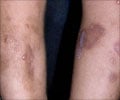Researchers suggest that recommending surgery for elderly patients suffering from skin cancer may not be the best option.

One in five patients in the study reported a complication from the skin cancer treatment, and approximately half the patients with limited life expectancy died of other causes within five years.
As a result, the authors say, doctors should take into consideration the benefits, risk and preference of a patient when determining appropriate treatment for nonfatal skin cancers.
The study will be published online on April 29, 2013 in JAMA Internal Medicine.
"It can be very challenging to decide whether and how to treat patients with non-melanoma skin cancer who have limited life expectancy, especially when the tumors are asymptomatic," said Eleni Linos, MD, DrPH, an assistant professor of dermatology at UCSF and lead author of the study.
"One challenge is that it is hard to precisely predict an individual's life expectancy," Linos noted. "Another challenge is that elderly patients are very diverse. For example, some 90-year-olds are active, healthy and would like to choose the most aggressive treatments for skin cancer, while others are very frail and unable to care for themselves, and may prefer less invasive management for a skin cancer that doesn't bother them.
Advertisement
Skin cancers are by far the most common type of cancer, according to the American Cancer Society. An estimated 2.2 million Americans – predominantly older patients – are diagnosed annually with a non-melanoma skin cancer, including basal cell carcinoma and squamous cell carcinoma. This type of cancer can be slow-growing and typically does not affect survival or short-term quality of life.
Advertisement
In comparing treatment options and clinical options, the researchers followed more than 1,300 patients in San Francisco for about a decade. About a quarter of the patients were classified as having limited life expectancy because they were at least 85 years old or they suffered from multiple serious health conditions.
Most of the non-melanoma skin cancers were treated surgically, a taxing process for seniors who have difficulty tolerating extended procedures or adequately treating their wounds at home. The researchers found that medical complications included poor wound healing, numbness, itching and pain.
Tumor recurrence was very low – less than 4 percent after five years, the authors said. Nearly half the patients with limited life expectancy died within five years – none of the deaths resulted from the skin cancers, the researchers reported. Most deaths were related to heart disease, cerebrovascular disease, lung cancer, pneumonia, chronic respiratory disease, prostate cancer and Alzheimer's disease.
"The findings highlight a challenge not just for dermatologists, but for all physicians treating non-fatal conditions," said senior author Mary-Margaret Chren, MD, a dermatology professor at the UCSF School of Medicine. "Our study provides useful evidence for clinicians facing a treatment choice dilemma with their patients – it focuses on a cancer whose natural history is generally benign, where treatment itself may be discretionary."
Source-Eurekalert














